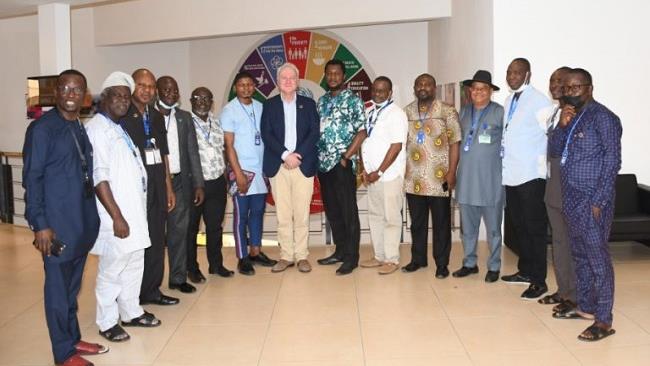The United Nations (UN) Resident Coordinator to Nigeria, Mr Matthias Schmale, says that UN is committed to assisting Nigeria attain the Sustainable Development Goals (SDGs) 2030.

Schmale said this at the end of a two-day training organised by the Media Awareness and Information for All Network (MAIN) in collaboration with the UN Information Centre (UNIC), in Abuja.
He said that one of the UN’s interventions in achieving the SDGs in Nigeria was through constant training and engagement with the media which play critical roles in attaining the SDGs.
The UN Resident Coordinator, who also decorated over 60 journalists in Abuja as Media Champions to the course, tasked the media on elaborate reportage and awareness creation on the SDGs.
“This is taking place in the context of the SDGs, the world including Nigeria has committed to seventeen strategic goals.
“We are in the middle as a UN team in Nigeria to define a new strategic development framework with government for the next five years.
“So, two things are key in my mind, one is that we agree with government, some transformative initiatives, we cannot just continue business as usual, then in five years we have the same result.
“To have impactful development in Nigeria, we have to change the way we work and up the game, we are in the middle of trying to define transformative initiatives,” he said.
Schmale said that they have had consultative meetings with media, adding that this would continue to ensure that the needed aim was achieved.
“We need you to help us think through and then explain to the population at large what the current situation is and why there need to be a really significant change.
“The government cannot solve this alone; the UN cannot solve this alone, we need important partnership and I think the partnership of the media fits into this.
“You are to help in spreading factual information including what is going on and holding government and the UN accountable on what we are doing.
“This will help us in achieving progress,” Schmale said.
Prof. Lai Oso, Chairman, MAIN and Resource Person, said that the training was to deepen the knowledge of journalists on key issues surrounding SDGs, particularly the interconnection of all the goals.
Oso said the training would also enable journalists understand better the three pillars of sustainable development: environmental sustainability, economic sustainability and social sustainability.
He said that with good knowledge on all these, journalists as Media Champions could drive the implementations of SDGs in Nigeria through a more comprehensive report.
“The training started from Maiduguri, we have been to Kano, this is the third league, and we will be going to Uyo, Enugu and Lagos for the six geopolitical regions of the country.
“And we hope that at the end of it all, our experience will help us develop a reporting guide on how to report sustainable development.
“People are really interested because we know that the challenges that we face cannot be solved by just looking at one issue, we need to look at interconnectedness of poverty, unemployment, and gender inequality.
“The media should be able to through comprehensive reporting, influence public policies.
“So that government can really be able to appreciate some of these issues and do the needful in terms of meeting the goals of sustainable development,” Oso said.
Dr Oluseyi Soremekun, UNIC National Information Officer, said that the training was geared towards enhancing sustainability reporting beyond the routine event of the day.
“We are bringing media together because if you look at even goal 16, it talks about freedom of information, and this is a group that acts as a bridge between the policy makers and the grassroot.
“If we are not conscious and deliberate about accelerating the action, we will be in trouble.
“More so, COVID pandemic has slowed us down, even the progress made has been reversed because of the pandemic and the lock down.
“To this end, we need the media because the media needs to understand the issues and report adequately,” he said.
Soremekun said that for the impact and interventions of SDGs to be sustained, and be of benefit to the society, the media must be involved.
“What we are saying is that if journalists should understand that at the centre of development will be the people, the issues will be solved.
“The SDGs are about the people and he or she will interrogate from that perspective,” Soremekun said.
By Lizzy Okoji
